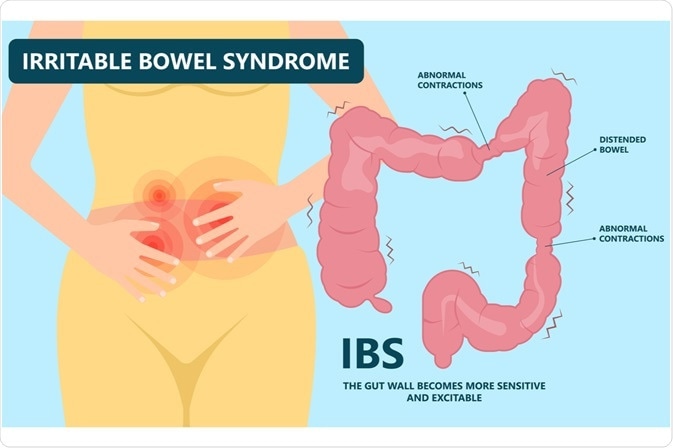Introduction
What causes IBS?
Change in IBS characteristics over time
Controlling the symptoms of IBS
References
Further reading
Irritable bowel syndrome (IBS) is a widely diagnosed and chronic disorder of the gastrointestinal tract that causes cramping, abdominal pain, bloating, and diarrhea or constipation. A small percentage of those with IBS develop severe symptoms that require intervention in the form of diet, lifestyle management, and medication.
 Image Credit: rumruay/Shutterstock
Image Credit: rumruay/Shutterstock
What causes IBS?
The exact cause of IBS is not known and may result from a number of separate or contributory factors. For example, the muscles of the intestine walls may be under- or over-active, causing constipation or diarrhea respectively. Similarly, the nerves leading to the digestive system may be dysfunctional, causing aberrant reception and signaling. Imbalance in the gut microbiome has also been found to play a major role in IBS development and flare-ups. As many cases of IBS go unreported, it is difficult to estimate prevalence, though placed between 5-20% by the National Institute for Health and Care Excellence (NICE, UK). Large-scale meta-studies also indicate that women are slightly more prone to IBS than men and that people aged 20-40 are mainly affected, with prevalence decreasing beyond this age.
Post-infectious IBS is specifically IBS that develops following acute infection of the gastrointestinal tract, several studies indicating that the percentage of individuals that develop post-infectious IBS varies widely from ~3% to 36% among differing populations, with factors such as age and severity of infection playing an influential role. Reportedly, around 63% of cases of post-infectious IBS following Campylobacter jejuni-associated enteritis eventually meet the Rome II criteria for diarrhea-predominant IBS (IBS-D). Further, of those patients with IBS-D, nearly 90% have had non-subtyped or constipation-predominant IBS (IBS-C) within a few years previously.

 Read Next: Post-Infectious Irritable Bowel Syndrome
Read Next: Post-Infectious Irritable Bowel Syndrome
Change in IBS characteristics over time
While the symptoms of IBS fluctuate over time, long-term changes in frequency and severity become apparent within the population. A meta study by El-Serag (2004) showed that over two years, 30-50% of individuals saw no change in IBS symptoms, with 12-38% seeing improved symptoms, while the remainder worsened. Around half of those affected by post-infectious IBS see symptoms resolve within 6-8 years of initial infection, with a poorer prognosis associated with symptom tenacity, history of surgery, and the presence of comorbidities such as anxiety and depression.
Unlike inflammatory bowel diseases such as ulcerative colitis, IBS does not damage the inner walls of the intestines and does not cause permanent damage to the intestines. Thus, there is no association between IBS and bowel cancers. However, bowel cancers may mimic the features of IBS; therefore, cancer needs to be ruled out during the diagnosis of IBS.
Controlling the symptoms of IBS
IBS tends to last a lifetime, and the symptoms often come and go. Many patients may have long symptom-free years interspersed between periods of severe symptoms. IBS does not shorten the lifespan of affected individuals or lead to major life-threatening complications in most patients, and most serious symptoms can be avoided through a controlled diet and avoiding stressful situations, as stress and anxiety are known to cause IBS flare-ups. Obesity is also a known factor in worsening IBS symptoms, and thus exercise and calorie-controlled diets are advisable in limiting IBS severity for such individuals.
In cases of IBS-D foods that contain high levels of insoluble fiber, such as wholemeal breads and whole grains, should be avoided, along with caffeine and carbonated drinks, which exacerbate symptoms. Alternatively, those with IBS-C should eat a good quantity of soluble fiber to help minimize flatulence and bloating. Optimal levels can be found by slowly and gradually increasing intake while continuously assessing symptoms. Various laxatives, anti-motility, and anti-spasmodic drugs can be prescribed to those suffering from IBS in an intermittent or ongoing manner, and therapy focusing on acceptance may also provide resilience against the worst psychological effects of chronic IBS.
What is irritable bowel syndrome (IBS)?
References
Further Reading